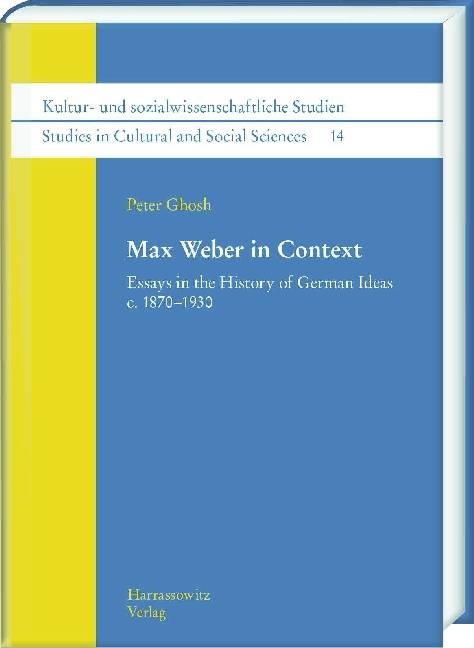
- Afhalen na 1 uur in een winkel met voorraad
- Gratis thuislevering in België vanaf € 30
- Ruim aanbod met 7 miljoen producten
- Afhalen na 1 uur in een winkel met voorraad
- Gratis thuislevering in België vanaf € 30
- Ruim aanbod met 7 miljoen producten
Zoeken
Max Weber in Context
Essays in the History of German Ideas C. 1870-1930
Peter Ghosh
Hardcover | Engels | Kultur- und sozialwissenschaftliche Studien /Studies in Cultural and Social Sciences | nr. 14
€ 152,95
+ 305 punten
Omschrijving
The aim of this book is twofold. It is a part of an ongoing project to show that Max Weber's ideas can only be fully understood in historical context, and it continues an inquiry begun in A Historian reads Max Weber (Harrassowitz, 2008) and Max Weber and the Protestant Ethic: Twin Histories (Oxford University Press, 2014). What is distinctive here is that the book takes Max Weber as a point of entry into the wider context of German-language ideas in the humanities and social sciences in the era prior to 1933, when German speakers were truly the center of advanced academic thought across the developed world. This history has been overshadowed hitherto by the Nazi catastrophe, but still it was one of the great creative epochs in European ideas and continues to lie at the foundation of our thinking today. Accordingly, seven major essays situate Weber in a series of more specific contexts: social science and economics; law; theology and religion; psychology and philosophy; academic publishing; and also in relation to those who, in Weber's eyes, had betrayed and abandoned the academic heritage of rigorous, "scientific" thought in favor of "literary" modes of proceeding. For Weber, specialization was both a fundamental necessity and a straitjacket to be overcome. This book seeks to read Weber in true "Weberian" fashion: that is, within and across a number of specialized disciplines and contexts, while also considering his place in the wider world of German-language "science" and Kultur.
Specificaties
Betrokkenen
- Auteur(s):
- Uitgeverij:
Inhoud
- Aantal bladzijden:
- 411
- Taal:
- Engels
- Reeks:
- Reeksnummer:
- nr. 14
Eigenschappen
- Productcode (EAN):
- 9783447105132
- Verschijningsdatum:
- 3/05/2016
- Uitvoering:
- Hardcover
- Formaat:
- Genaaid
- Afmetingen:
- 178 mm x 244 mm
- Gewicht:
- 907 g

Alleen bij Standaard Boekhandel
+ 305 punten op je klantenkaart van Standaard Boekhandel
Beoordelingen
We publiceren alleen reviews die voldoen aan de voorwaarden voor reviews. Bekijk onze voorwaarden voor reviews.







